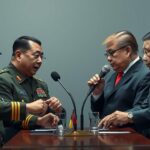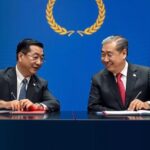Politics
ASIA, BIDEN ADMINISTRATION, CHATHAM HOUSE, CHINA, FOREIGN POLICY, GEOPOLITICS, MEXICO, NATIONAL SECURITY, NORTH AMERICA, PEKING UNIVERSITY, PINEBRIDGE INVESTMENTS, REUTERS, TAIWAN, UNITED STATES, US-CHINA RELATIONS, WANG DONG, WASHINGTON, WHITE HOUSE, XI, XI JINPING, YU, YU JIE
Sophia Klein
China Prepares for Trump’s Second Term: Economic and Geopolitical Challenges Ahead
China is bracing for a potentially volatile relationship with Donald Trump during his second presidential term, marked by anticipated tariffs and trade wars that could surpass those seen in his first term. Xi Jinping’s government is attempting to navigate these challenges by diversifying trade and enhancing domestic technology capabilities, while uncertain geopolitical factors surrounding Taiwan further complicate the situation.
China is preparing for four years of potentially turbulent relations under a second term of Donald Trump, who has expressed intentions to impose significant tariffs on Chinese imports. President Xi Jinping has acknowledged the new political landscape, advocating for a cooperative China-U.S. relationship while anticipating challenges exacerbated by a deteriorating Chinese economy. Analysts predict that the upcoming trade war could exceed the severity experienced during Trump’s first term. Trump’s unpredictable approach towards China during his presidency has drawn concerns, particularly with his campaign promise of imposing tariffs up to 60% on approximately $500 billion in Chinese goods. In response, China is working to diversify its trade relations, particularly with developing nations, while striving to enhance its technology sector capabilities following restrictions from the U.S. On geopolitical matters, Trump’s stance towards Taiwan remains unclear. While He expresses confidence that he can negotiate favorable terms with China regarding Taiwan, the potential consequences of such negotiations remain speculative. Analysts remain cautious about Trump’s strategies, indicating that Taiwan’s status could complicate any potential agreements. Moreover, concerns regarding China’s support for Russia amid the Ukraine situation could shift dynamics depending on Trump’s actions in office. If he reduces military assistance to Ukraine, it might afford Beijing a stronger position in negotiations on various global issues. Xi seeks to portray China as a stabilizing force, in contrast to U.S. actions that are often viewed as disruptive, especially regarding international conflicts.
The article examines the implications of Donald Trump’s re-election on China’s economy and geopolitical strategies. It places particular emphasis on the anticipated economic policies, including tariffs on Chinese imports, as well as the possible increase in tensions surrounding Taiwan. The analysis underscores the shifting dynamics in U.S.-China relations against the backdrop of rising global tensions and domestic challenges faced by China.
In summary, as Donald Trump prepares for a second term, China braces for both heightened economic challenges due to potential tariffs and geopolitical risks surrounding Taiwan. Analysts predict that the trade conflict may become more intense than previously experienced, highlighting the adaptive strategies Beijing is implementing. The geopolitical landscape remains precarious, dependent on how both nations navigate their complex relationship amidst ongoing global tensions.
Original Source: www.theguardian.com







Post Comment